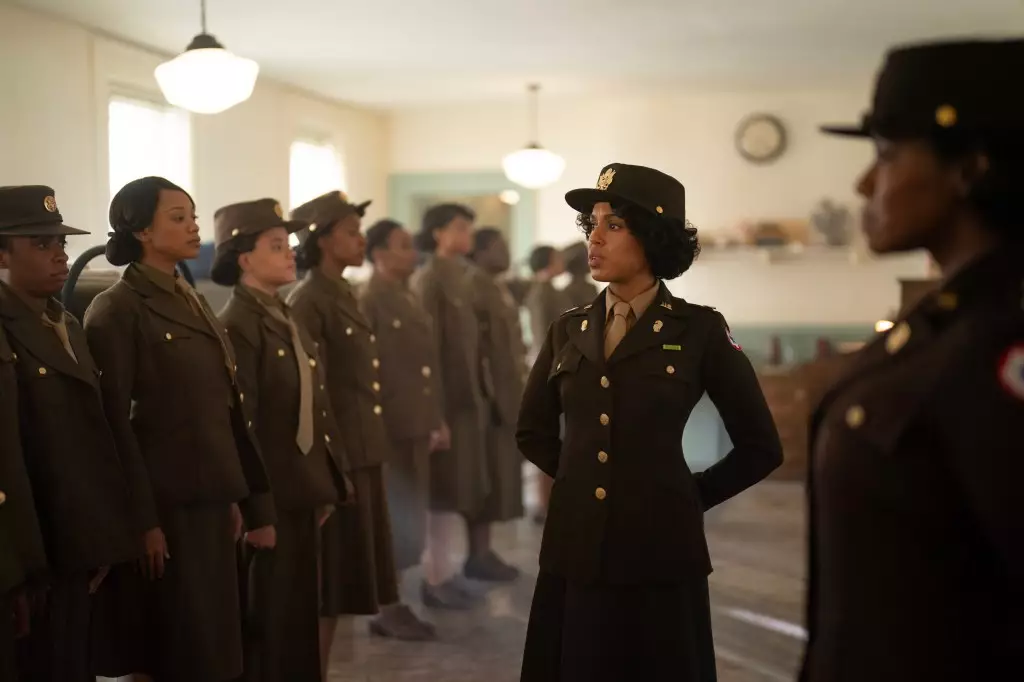Tyler Perry’s latest cinematic endeavor, *The Six Triple Eight*, takes a profound step into the historical narrative of World War II by spotlighting the brave women of the 6888th Central Postal Directory Battalion. Launching on Netflix following its theatrical release, this film is not merely a retelling of wartime events but an important exploration of the resilience and heroism of over 855 women of color—primarily African American—who served against a backdrop of rampant racism and sexism. In a time when tales of wartime valor often center on male counterparts, Perry unveils a largely overlooked narrative that merits attention and respect.
Set in 1945, as the war rages on in Europe, *The Six Triple Eight* portrays the critical role that the Women’s Army Corps played in upholding the morale of troops by ensuring that communication from home was maintained. The phrase “No Mail, No Morale,” coined by Major Charity Adams, encapsulates the gravity of their mission, as these women faced the monumental task of sorting and delivering over 17 million pieces of mail. This essential operation was not simply bureaucratic; it provided a vital lifeline to soldiers who were separated from their families, often enduring harrowing conditions. The film emerges as a compelling reminder of how history often overlooks the contributions of marginalized groups.
At the heart of *The Six Triple Eight* is Major Charity Adams, portrayed with grace and strength by Kerry Washington. Through her character, viewers are invited to witness the intense pressures faced by leadership in a male-dominated military environment. The film beautifully intertwines Adams’s personal struggles with those of her fellow soldiers, including the touching story of Lena Denniecott King, played by Ebony Obsidian. King’s poignant journey—filled with uncertainty about her loved ones—acts as a narrative anchor, enabling audiences to connect emotionally with the broader historical context.
The ensemble cast, featuring dynamic characters like Captain Campbell and the fierce Johnnie Mae, is a testament to the diverse experiences within the battalion. Each character contributes uniquely to the narrative, further enriching the emotional tapestry of the film. Perry’s decision to delve into individual stories ensures that the burdens these women carried are felt deeply, creating a personal connection that transcends time and resonates with contemporary audiences.
Tyler Perry’s direction avoids the pitfall of excessive sentimentality, instead portraying the stoic pride that characterized these women’s service. His storytelling strikes an effective balance, allowing for moments of levity amidst the harsh realities they faced. The choreography, particularly in the marching sequences crafted by Debbie Allen, adds an impressive artistic layer, emphasizing collective strength formulated through unity and discipline.
Moreover, Perry’s script does not shy away from addressing the monumental challenges posed by both external obstacles and internal conflicts. Illustrating how pervasive societal attitudes influenced the military culture of the era elevates the film from simple tribute to deeper social commentary. The interactions between Adams and men like General Halt, depicted by Dean Norris, reveal the systemic sexism and racism that threatened the success of their mission, adding drama that serves as a critical reflection on historical context.
A noteworthy aspect of *The Six Triple Eight* lies in its production design and authentic costuming, which faithfully recreate the 1940s ambiance. Karyn Wagner’s costume design encapsulates the era’s spirit while ensuring that each outfit reflects the identities of the characters. Sharon Busse’s adept production design creates immersive settings that allow audiences to engage fully with the world these women inhabited.
Aaron Zigman’s score, complemented by the emotionally charged ballad “The Journey” performed by H.E.R., serves to underscore the film’s poignant themes. This musical backdrop enhances the narrative, shaping emotional responses that linger long after the credits roll. The collaboration among the talented production team enhances the overall impact of the film, ensuring that its historical fidelity resonates powerfully.
Scheduled for a global debut on December 20, *The Six Triple Eight* stands as a timely tribute to fallen soldiers and the unsung heroes of the past. This holiday season, as viewers reflect on sacrifice, duty, and resilience, the film invites a broader recognition of women’s integral roles in the military. Perry’s adaptation of this crucial chapter of history deserves applause for shining a light on their contributions while sparking essential conversations about race and gender in service.
In essence, *The Six Triple Eight* is not just a historical account, but a powerful narrative that challenges audiences to acknowledge and celebrate the legacy of those women who, despite facing overwhelming odds, forged ahead with courage and determination. This film promises to ignite discussions and ensure that the sacrifices of the 6888th are recognized and remembered for generations to come.


Leave a Reply